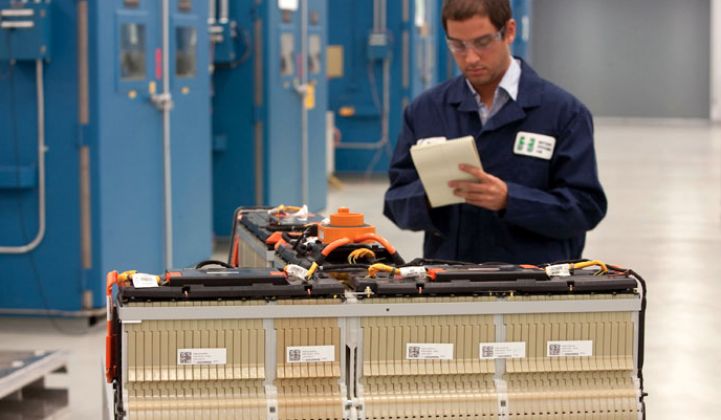LG Chem appears to have exercised some poetic license in claiming to be “the world’s biggest automotive battery supplier” following a deal with Daimler.
The Korean battery maker based its assertion on the number of electric vehicle (EV) automakers it works with: 13 out of 20 global brands, it said in a press release.
But in volume terms, the company still lags far behind its Japanese competitors Panasonic and Automotive Energy Supply Corporation (AESC).
According to Logan Goldie-Scot, an associate at Bloomberg New Energy Finance, in 2014 Panasonic had 39 percent of the market and AESC had 21 percent, dwarfing LG Chem’s 12 percent share.
“I certainly wouldn’t say they are the largest supplier,” said Goldie-Scot. “It’s behind Panasonic and AESC in capacity market share. Even in terms of number of vehicles sold, the best-selling vehicle is the Nissan Leaf, and that’s supplied by AESC.
"I don't believe it's even the market leader in terms of number of separate relationships, since it faces competition from Samsung SDI and Panasonic."
Other sources broadly agree with this assessment, giving Panasonic a 38 percent share of the market by volume, AESC 23 percent, and LG Chem 12 percent. BYD, Mitsubishi-GS Yuasa, and Samsung SDI all had shares of between around 5 percent and 10 percent in 2014.
Such trivialities didn’t change messaging from LG Chem’s executives as part of the Daimler deal announcement.
“LG Chem will continue to lead the EV battery market with differentiated technology to make us stand up as [the] global No. 1 battery manufacturer,” gushed Young Soo Kwon, the president of LG Chem’s Energy Solution Company division.
In fairness to LG Chem, the company has had remarkable success in courting automotive customers.
Its polymer pouch cell batteries are used in models from Volkswagen, Ford, Hyundai, Renault, Audi, Chevrolet, Kia, GM, and now Daimler Group, which kick-started the whole automotive sector back in 1886.
Daimler Group today includes the Mercedes-Benz, Smart, Mitsubishi Fuso and Freightliner brands. The deal announced last month will see LG Chem supplying lithium-ion products for a Smart EV that is due to hit the streets in 2016.
Smart currently sells around 100,000 vehicles a year, LG Chem said. Reuters confirmed LG Chem was to be the sole battery cell supplier for Smart’s electric vehicle variant, although no details of the value or volume of the contract have been released.
Reuters said Deutsche ACCUmotive, a Daimler Group company, will assemble the LG Chem cells into battery packs. Meanwhile Daimler is planning to close another battery-making unit, Li-Tec, at the end of this year.
Previous reports had said Daimler would be investing $125 million in the production of lithium-ion batteries at Deutsche ACCUmotive, which also supplies products for the Mercedes hybrid S-Class, E-Class, and C-Class models.
Elsewhere in the Mercedes range, Daimler is sourcing the battery, motor, transmission, and power electronics for its B-Class models from Tesla, which in turn sources cells from Panasonic.
In fact, it is the Tesla connection that is largely responsible for Panasonic’s leadership in the electric vehicle battery volume stakes.
Tesla’s batteries are much bigger than those of other manufacturers, typically packing 60 or even 85 kilowatt-hours compared to just 24 for a Nissan Leaf. Daimler was an early investor in Tesla but sold its stake last year.
It is unclear how this cooling relationship might affect future decisions over battery technology at the German carmaker. In fact, very little is set in stone in the still-volatile electric vehicle battery market.
AESC, for example, has seen a major drop in its market share over the last couple of years. The company, a joint venture between NEC and Nissan, had around 36 percent of the market in 2012.
However, it has lost ground to LG Chem, which Nissan increasingly prefers as a supplier. Meanwhile LG Chem faced challenges of its own last year as its market share dropped around 6 percent compared to 2013 levels.
With the total electric vehicle market still small, but growing fast, just about anything could happen in the next few years. And it is certainly not inconceivable that LG Chem might one day be able to live up to its claims -- but not just yet.
“LG Chem shows potential in this market,” says Andrew Mulherkar, a grid analyst with GTM Research, a division of Greentech Media. “It's also true that LG Chem has a wider set of relationships with automotive manufacturers than most. But its fortunes are obviously tied to the success of its automotive customers. Daimler's market share doesn't appear large enough yet to significantly change LG Chem's standing in this market.”



